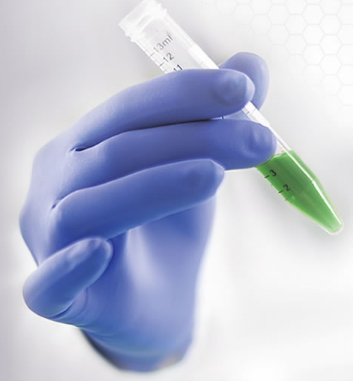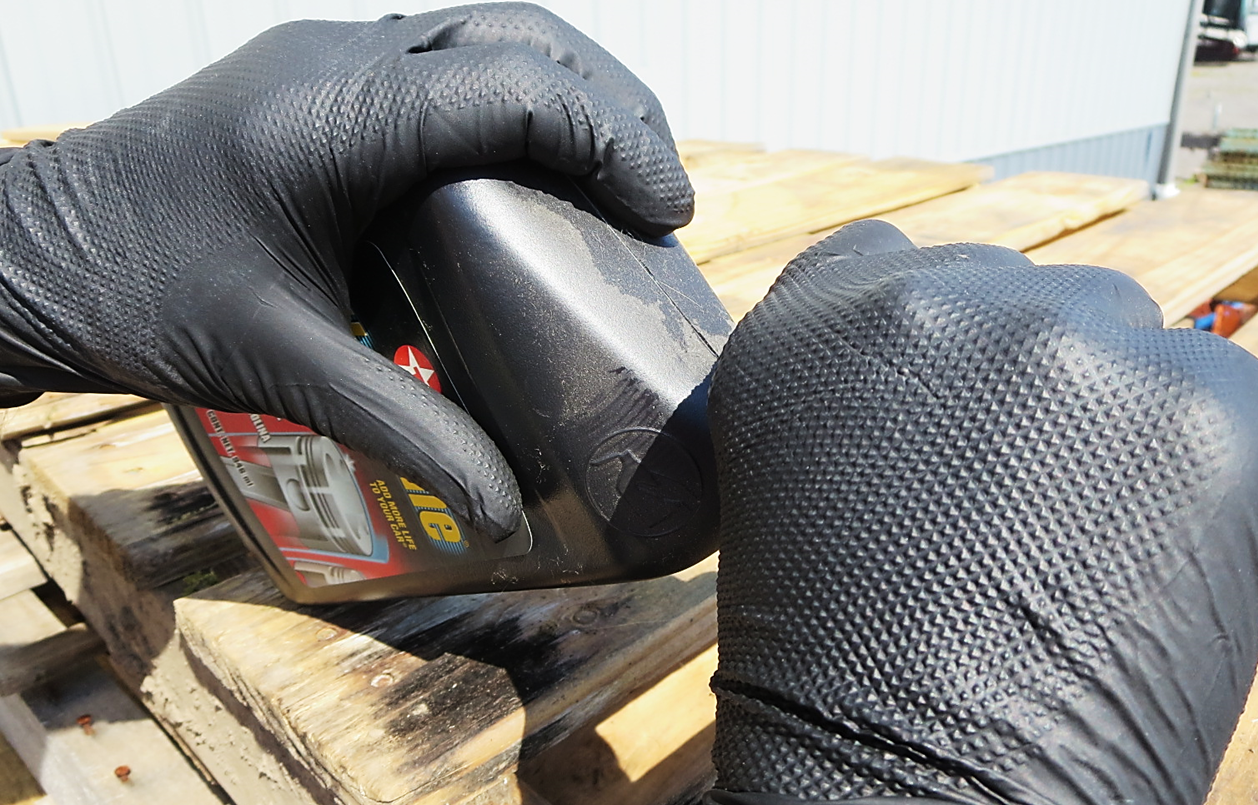Latex-Free Single-Use
Nitrile Gloves | 101
**you can skip reading the article and +shop for Single-Use Nitrile Gloves here now
Whether industrial applications involve harsh chemicals or medical applications with exposure to bloodborne pathogens, a glove’s primary purpose is to protect the wearer’s hands from infection or cross-contamination liabililities. Single-use nitrile gloves are perhaps the most popular disposable glove style today and are commonly worn in healthcare, food and beverage, cleanroom, tattoo, spas, security/law enforcement, automotive, janitorial, plumbing, paint shop and chemical manufacturing.
 ADVANTAGES
ADVANTAGES
Stronger than latex or vinyl, with the fit, feel, and comfort that rivals that of latex but without the latex allergies, nitrile gloves are typically more expensive than other materials. Nitrile is more durable, better suited for extended-duration use and provide a wide spectrum of protection in a variety of work settings. Offered in different thicknesses, nitrile conforms to hands for a uniform, more comfortable fit and have a longer shelf life than natural latex rubber.
- Nitrile has many features that make it extremely versatile
- Flexible, tactile and semi elastic
- Conforms to hands as the nitrile warms from body heat for better dexterity
- Powder-free for no residue
- Latex-free for less allergic reactions
- Chlorinated for easier glove changes
- Nitrile is recommended use on a wide variety of chemicals
With so many options, selecting the proper disposable nitrile glove to complete the task at hand can be challenging. Too thin of a glove results in permeation or tearing and too thick of a glove can reduce tactile sensitivity or create hand fatigue. Below is some information to help you along in the selection process.
CHEMICAL BARRIER PROTECTION
Nitrile has three times the puncture resistance of latex, as well as more abrasion and chemical resistance and is recommended for handing almost 75% of common chemicals on the market. Nitrile is able to withstand mineral oils, solvents, vegetable oils, grease, gasoline, diesel fuel, and many acids. Permeation or the breakthrough time will vary depending on the glove’s thickness.
LATEX ALLERGIES
Nitrile is free of latex proteins and will not aggravate individuals with latex allergies. This is especially important not only for those who are sensitive to latex but also for users who come into direct physical contact with the public such as medical and dental professionals, security personnel, tattoo artists, and salon workers. Many pharmaceutical and food processors cannot tolerate the presence of latex proteins within their production.
EXAM OR INDUSTRIAL
Nitrile gloves are manufactured in industrial and medical exam grades. Many industrial-grade or general purpose nitrile gloves are thicker to better withstand more demanding and rougher applications. To protect against bloodborne pathogens, exam-grade gloves must pass a series of tests to meet safety requirements established by the U.S. Food and Drug Administration. Gloves are tested for puncture and abrasion resistance, run through tension and elongation tests, and checked for chemical resistance.
Glove inspection is based on acceptable quality limits (AQL) set by the FDA. Because the medical field has more risks, the AQL number is lower for medical-grade gloves than general-duty styles. Testing methods for AQL come from the American Society for Testing and Materials (ASTM), which creates standards for industries all across the world. Manufacturers typically produce medical and industrial-grade gloves on the same production line. Most of the time when you purchase industrial-grade gloves, they are very nearly medical grade.
The National Fire Protection Association (NFPA) standard 1999 specifies the requirements for EMS protective clothing to protect the user from performing patient care during emergency medical operations from contact with blood and body fluid-borne pathogens. The standard coincides with and meets Occupational Safety and Health Administration (OSHA) Final Rule (29 CFR 1910.1030) Protecting Health Care Workers from Occupational Exposure to Bloodborne Pathogens.
THICKNESS
Glove thickness is usually expressed in mils. A mil has nothing to do with millimeters but rather is a unit of thickness equal to one-thousandth (.001) of an inch. Gloves of 3 mils or less are better suited for jobs that require high tactility but do not require strong protection from chemicals or hazardous materials although some thin mil gloves are now rated for chemotherapy compounds. Gloves in the 5- to 6-mil range are dependable for a variety of applications, from general duty to heavier automotive or industrial needs involving tools and machinery. Gloves 8 mils and above are rated for heavy-duty use or high-risk applications. As mil thickness increases, more specialized uses become prevalent.
In the application and use of disposable gloves, there is a direct correlation between thickness, material, and chemical resistance. The thicker the glove, typically the stronger the chemical resistance (but the more dexterity is reduced). Thicker gloves are more expensive to make, and therefore cost more.
TEXTURE
Gloves may be textured on just the fingers, the fingertips or the entire surface that includes the palm region of both sides of the glove. Textured surfaces on gloves create a stronger grip in dry, wet or oily conditions. Textures range from micro-roughening for basic needs to aggressive raised diamond texture, which channels away liquids providing wearers with a secure grip even when gloves are slick.
COLOR
The use of color in the workplace is becoming very popular and today's disposable gloves come in a rainbow of colors. They are available in white, many shades of blue, black, orange, green, pink, purple, magenta, lavender, gray and more. For those working in low-light conditions, disposable gloves made in high-vis colors such as orange will enhance safety.
Pharmaceutical and food processing plants are highly sensitive to contaminates in raw materials and finding a shred of a non-white, colored glove becomes easier to find and easier to trace back to the line or department. For some, colors can be a fashion statement and for others it helps masks contaminates. For example, black colored gloves hide grease, dirt, blood while pink is typically worn for cancer awareness.
BREACH ALERT VISUAL DETECTION
A torn, punctured or shredded glove can not only put one’s life at risk to infection, it can halt emergency services. This is where Breach Alert™ visual identification technology can help. Growing in popularity, this technology provides wearer's with a durable dual-layer construction and contrasting inner color that allow the wearer to identify potential breaches in the protective barrier providing extra durability, safety and confidence.
SUSTAINABLE SINGLE-USE NITRILE GLOVES DOMESTICALLY MADE IN ALABAMA, USA!
Taking the next step in sustainability, SHOWA® has also expanded its biodegradable product range of hand protection products featuring Eco Best Technology® (EBT) and are producing the first ever U.S. made sustainable single-use nitrile glove right in Alabama, USA! Gloves with EBT offer the same protection, texture, performance and grip as their regular glove counterparts, but feature accelerated breakdown which is one solution to reduce the rubber solid waste disposal problem and is ultimately better for the planet!
MDS offers customers with a wide variety of single-use industrial and medical grade nitrile gloves in different colors, lengths, thickness, textures and we’re proud to also offer a vast selection of sustainable nitrile gloves that meet the ASTM D5511 test standard. Prevention is just a click away. All you need to do is tap the link and …
+shop for Single-Use Nitrile Gloves here now
Orders. Questions. Volume Discounts. Special Requests.
Click or Call Today
Monday - Friday 8:30am - 4:30pm EST
+800.274.4637 | +716.668.4001 | Fax +716.668.4496 | [email protected] | MDSassociates.com
"We want you to return home safely every day"



